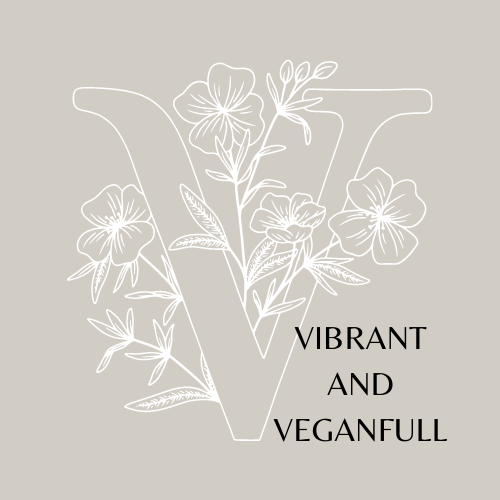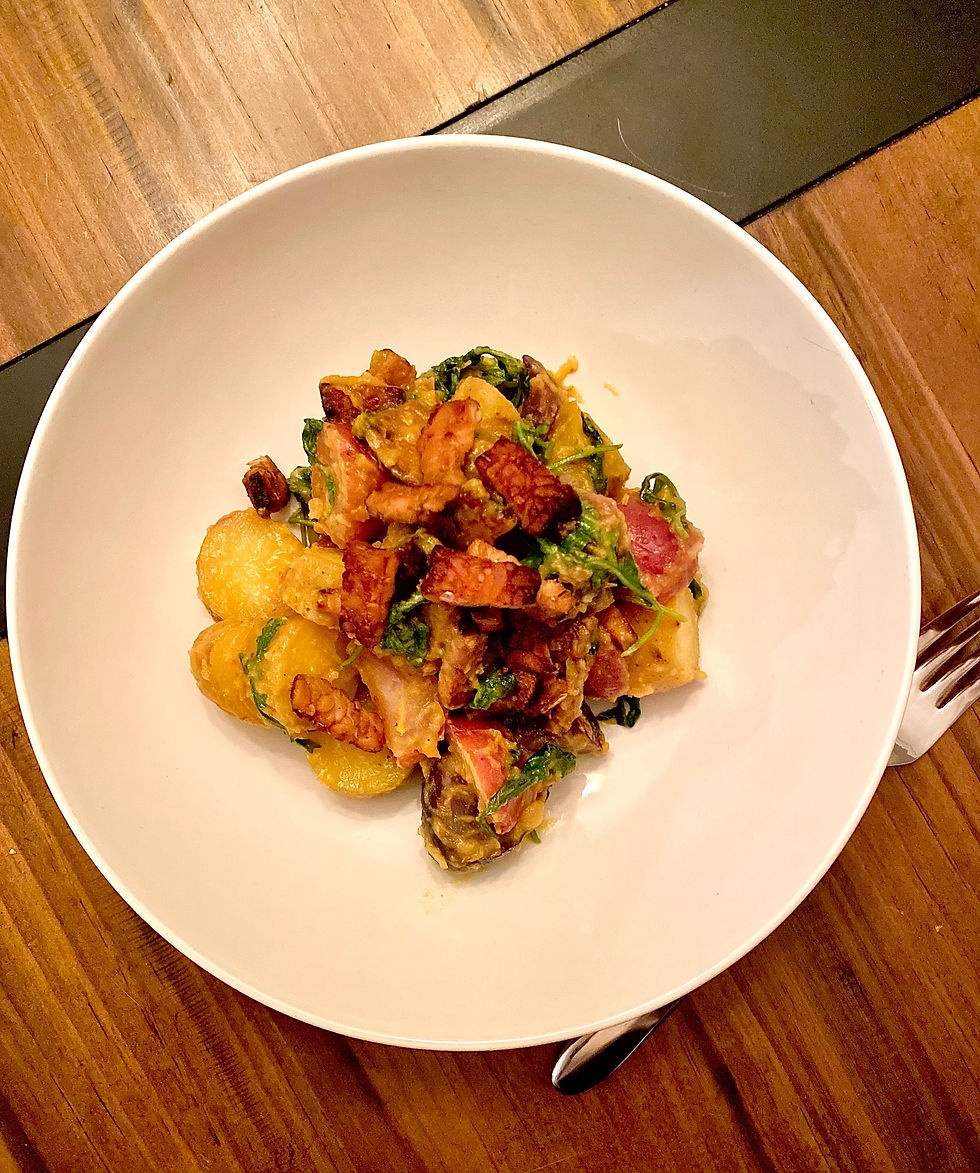Warm Turmeric Potato Salad with Arugula and Tempeh Bacon
- Jamie Langes

- Mar 1, 2022
- 4 min read
My husband's family hails in half from Italy (which I think I've mentioned) but the other half is Austrian-German with the first immigrants coming over from Europe only 2 generations ago (so, my husband's grandparents). He regales me with stories about how his grandmother (a fiery petite lady who I had the extraordinary pleasure to know) would use crossword puzzles to learn and strengthen her English. He recalls her knödel (a bread dumpling made from stale bread and other "add ins") which was crafted from whatever she had on hand. It was a recipe borne from an era and a cultural lifestyle that pressed upon her the very real and necessary hardships for basic resources. They just "made do," and the knödel recipe was her way of making do with food scarcity.
Her stories are those heard world around from immigrants past, present (and probably) future, looking to better their life in coming to American shores. I greatly admire the sheer force of will it takes to leave behind what is known, to travel the seas, arrive in America and make a life on a strange continent with so many unknowns ahead. I think, in particular, the availability of food in America was something that my husband's grandmother never quite got used to as a part of the culture. Despite having access to food resources, she was hard-pressed to overcome emotional associations from her past around food availability.

Sustainability Spotlight: Food availability is incredibly stratified across the globe. According to the United Nations, the world produces enough food to feed a human population of 10 billion. At 7.6 billion currently, that would be enough to feed 1.5 X's the people on the planet. However, due to socio-economic differentials (and in some cases extreme divides), which was only exacerbated by the pandemic (COVID-19), and is further being impacted by climate shift, the divide between food scarcity and food abundance is only widening (visit FAO.org - Food and Agricultural Division of the United Nations to learn more). It is estimated that a population on the planet double the size of the United States faces hunger. Of that number, 418 million live in Asia, 282 million live in Africa, and 60 million live in South America / The Caribbean.
"The high cost of healthy diets coupled with persistent high levels of income inequality put healthy diets out of reach for around 3 billion people, especially the poor, in every region of the world in 2019....Shifting to healthy diets that include sustainability considerations can contribute to reducing health and climate change costs by 2030, because the hidden costs of these diets are lower compared with those of current consumption patterns." (FAO.org).
The FAO identifies 6 Pathways to food resilience, and one of those rests squarely upon scaling up climate resilience across food systems. What does food resilience entail exactly? It means a few things, but for sustainability purposes, it means considering climate change and how climate affects food production. While climate shift is affecting every country and every climate, it disproportionately affects developing countries because they are most affected by climate change but have less economic resources to combat the problems that come with climate change. Therefore, these countries are also those least able to afford climate shift consequences.
So, how do we increase food resilience across the world? By reducing our impacts and consumption where food scarcity is not a factor. In countries like America (where we have food security), we reduce our impacts by meal planning, adopting a make-ahead and use it up ideology around the food resources we have, and we most certainly buy "in season" produce to reduce the impacts of import/export loads. Our everyday activities around food and around resource consumption is (and has been) accelerating the disparity for access to healthy options (whole foods and vegetables mostly). If we each take a little piece of the accountability for climate shift and do better with our resources for food availability, we can alter the landscape of the future for food resilience.
We can provide a global culture that differs from that of my husband's grandmother and alleviate the emotional impacts that food scarcity has on the next generations; especially the children of this world that need this generation and older to be better, do better.
While this recipe isn't the knödel, it did use up mostly pantry ingredients mixed with some lingering fresh and is a nod to one of my husband's actual favorite dishes from his grandmother - German Potato Salad. The recipe is vegan-ized to participate in our part of alleviating the acceleration of climate shift, but resonates in recognition of the fact that we are very lucky to have food security mixed with a rich cultural memory.
Ingredients:
1 package tempeh bacon (I used Lightlife brand Smokey Tempeh for this recipe)
1 lb creamer (fingerling) potatoes (cut into bite-sized pieces)
1 large handful baby arugula
Turmeric Mustard Dressing:
1 large shallot (chopped)
3 tbsp Sherry Vinegar
1 tsp salt
1/2 tsp turmeric
10-12 roasted garlic cloves
1 tsp stone ground mustard
6 tbsp avocado oil
4 tbsp filtered water
1 tbsp maple syrup
Directions:
Bring the potatoes in a large pot of salted water to boil over medium-high heat. Boil for ~20 minutes until easily pierced with a fork.
While your potatoes are boiling, add all ingredients in Turmeric Mustard Dressing to a personal blender and pulse (then blend) till smooth and slightly foamy. Set aside.
Still while your potatoes are boiling, dice your tempeh bacon and saute with a tsp of avocado oil in a skillet over medium-high heat. Stir infrequently to "crisp" for 5-7 minutes. Set aside when done.
Now that your potatoes are done, drain (save that water to cool & use for indoor plants!) and return the pot to low heat. Shake pan vigorously to "fluff" potatoes and remove excess water from the pan
Turn off heat and stir in arugula and your prepared dressing - continue to stir till potatoes are fully coated and arugula wilts (~1 minute).
Scoop out spoonfuls of the warm potato salad into bowls and top with your crisped tempeh bacon. Serve immediately.
With love & hope for a better future for all of us - Jamie




Comments